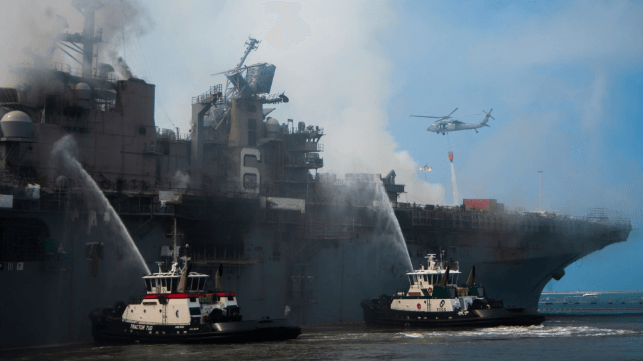Report: U.S. Navy May Lack a Full Picture of its Fire Risks

The U.S. Navy has lost two warships and billions of dollars to fire damage during refits over the past decade, but the service still does not appear to have a firm grasp on the extent of the risk, according to a new report from the Government Accountability Office.
Between 2008 and 2022, the Navy reported damages due to fire totaling about $4 billion, including two total losses (USS Miami and USS Bonhomme Richard). In response, it has instituted several reforms, including better firefighting training and a clear command structure for fire-response during maintenance periods.
On Congress' request, GAO examined the Navy's fire safety records, interviewed officers and conducted site visits to evaluate how well the service is studying and addressing its fire risk. It found that the Navy does not consistently gather near-miss reports and lessons learned in one place, and that underreporting appears to be a challenge.
Navy officials told GAO that many small fires get extinguished by the crew right away, and that these minor incidents often do not get reported. They warned that "the underreporting has given the Navy a false sense of security with fire incidents and an incomplete picture of the true extent of the problem." Part of the issue may be that some sailors are not aware that all fires have to be reported; part of the challenge may also be "a culture among Navy personnel that did not encourage full compliance with reporting requirements."

that matters most
Get the latest maritime news delivered to your inbox daily.
The fires that do get reported are rarely reported in the right place, according to GAO's findings. A 2019 study by Naval Safety Command found that 92 percent of reported fires were not recorded in the service's reporting system of record. Instead, they appeared in other databases, and some entries were incomplete. According to Naval Safety Command, "everyone uses their own reporting systems" to record fire incidents. (Some users complained that the official reporting portal was too cumbersome and slow, explaining their reluctance to use it.)
"The Navy does not have a process for consistently collecting, analyzing, and sharing these lessons learned. As a result, the Navy has lost lessons learned over time—such as steps that a ship can take to improve fire safety," GAO concluded. "No organization is analyzing the broad effects of fires on the Navy’s operations and strategic resources. Without conducting such analyses, the Navy will not have a complete picture of the magnitude of risks associated with ship fires."
